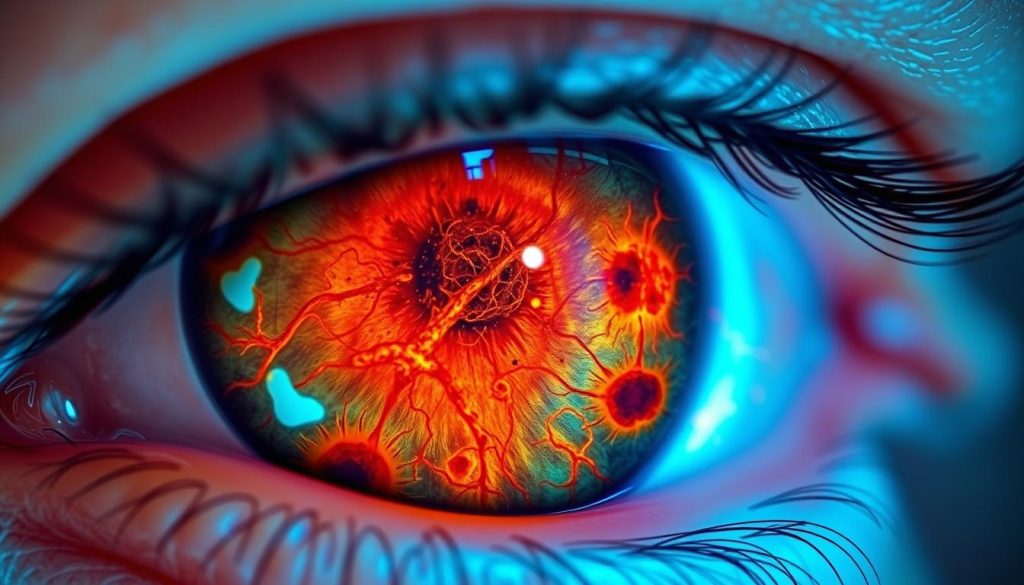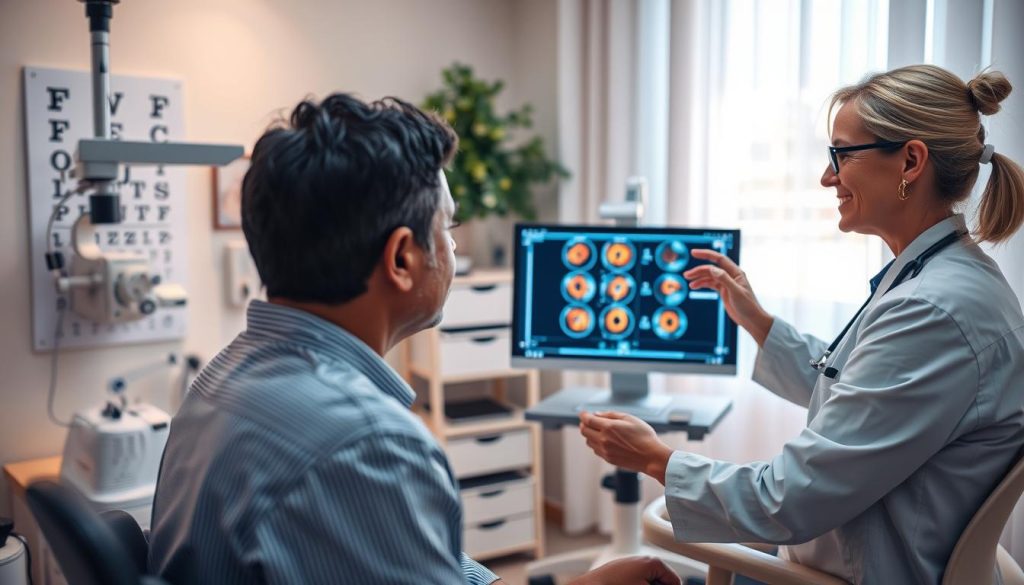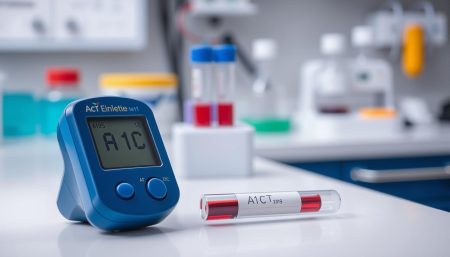Diabetes mellitus affects millions worldwide, leading to serious health issues. One major problem is diabetes mellitus retinopathy. This condition happens when high blood sugar damages the retina’s tiny blood vessels. It can cause severe vision loss in diabetes.
Learning about this disease is key to managing it. It helps protect your vision. Managing diabetes is essential for your health and eye health. Early detection and care can slow the disease’s progress and protect your vision.
Proactive treatments and lifestyle changes can greatly improve outcomes. They help those facing this diabetes-related challenge.
Understanding Diabetes Mellitus Retinopathy
Diabetes mellitus retinopathy is a big worry for people with diabetes. It can cause vision loss and blindness in adults. Knowing about it is key because it affects many people with diabetes.
This condition happens when high blood sugar damages the blood vessels in the retina. At first, these vessels might swell and leak, or they could close off. This stops blood from flowing properly.
Then, new blood vessels might grow on the retina’s surface. This can lead to serious vision problems. The damage can get worse, from mild to severe.
The Epidemiology of Diabetes Eye Disease
The spread of diabetes eye disease changes based on where you are, who you are, and your economic status. Knowing how common it is helps us see its big impact. It also helps us find out who is at higher risk.
Things like how long you’ve had diabetes, how well you control your blood sugar, and your genes matter a lot. Doctors study this to find better ways to catch it early. They want to stop it from causing permanent blindness.
Recognizing the Early Signs of Diabetic Retinopathy
Knowing the early signs of diabetic retinopathy is key for those with diabetes. These signs are the first hints that eye problems are starting. If ignored, they can cause vision loss in diabetes.
Spotting these signs early can help manage the condition. This can prevent serious problems later on.
- Blurred vision that comes and goes or is consistently poor,
- Seeing dark spots or floaters,
- Difficulty with perceiving colors,
- Problems with night vision,
- And a sudden loss of vision in severe cases.
People with diabetes should get their eyes checked often. Early detection of diabetic eye problems means better treatment options. This can help avoid severe vision loss in diabetes.
If you notice any early signs of diabetic retinopathy, see a doctor right away. This way, you can start treatment early. Regular eye exams are important to catch problems before they get worse.
Causes Behind Retinal Damage in Diabetes
Understanding why retinal damage happens in diabetes is key for patients and doctors. High blood sugar levels for a long time cause eye problems. Keeping blood sugar in check is very important.
The Impact of Blood Sugar Levels on Retinal Health
High blood sugar can harm the blood vessels in the retina. Over time, these vessels can weaken or get blocked. This can damage the retina and lead to vision problems.
Long-Term Diabetes and Its Effects on the Eyes
Long-term diabetes can severely affect the eyes. High blood sugar damages the retinal vessels. This increases the risk of serious eye problems.
People with diabetes should get their eyes checked often. Early detection and treatment can prevent serious eye damage. This helps avoid long-term vision loss.
Progression and Stages of Diabetic Eye Problems
It’s important to know how diabetic eye problems get worse. This is called the stages of diabetic retinopathy. Each stage has its own challenges and diabetic eye complications. This means we need different treatments and ways to keep an eye on things.
The early stages might not show many signs. But they can quickly get worse and hurt your vision a lot. Here’s a closer look at these stages:
| Stage | Description | Typical Symptoms |
|---|---|---|
| Mild Nonproliferative Retinopathy | Microaneurysms occur as small areas of balloon-like swelling in the retina’s tiny blood vessels. | Usually symptomless |
| Moderate Nonproliferative Retinopathy | Blood vessels that nourish the retina become blocked. | Minimal vision problems, possible difficulty in low light |
| Severe Nonproliferative Retinopathy | More blood vessels become blocked, depriving several areas of the retina with their blood supply, which signals the body to grow new blood vessels for nourishment. | Blurred vision, more noticeable vision loss |
| Proliferative Retinopathy | The advanced stage where the growth of new blood vessels leads to serious vision problems. These new vessels are abnormal and fragile, often leading to leaks of blood and fluid into the eye. | Visible spots or floaters, severe vision complications |
The table shows how diabetic eye problems get worse. It’s vital for both patients and doctors to understand this. Catching problems early and treating them right away is key to avoiding serious diabetic eye complications.
Diabetes Mellitus Retinopathy
Diabetes mellitus retinopathy covers a wide range of eye problems. These go from mild, nonproliferative stages to severe proliferative stages. Knowing about these stages is key for managing and treating the condition effectively.
From Mild Nonproliferative to Proliferative Retinopathy
Proliferative retinopathy is the most severe stage of diabetes mellitus retinopathy. In this stage, abnormal blood vessels grow on the retina’s surface. These weak vessels can bleed, causing serious vision loss or even blindness if not treated.
The move from mild forms, like microaneurysms, to this severe phase shows why controlling diabetes is so important. Regular monitoring and control of diabetes are vital.
Diabetic Macular Edema and Its Consequences
Diabetic macular edema is when fluid builds up in the macula, a part of the retina. This area is key for clear central vision. This condition often comes from worsening diabetic retinopathy and can greatly affect daily tasks that need sharp vision.
It’s essential to manage diabetic macular edema to keep quality of life. This means finding and treating it early.

Risk Factors Associated with Diabetic Retinal Disease
It’s important to know the risk factors for diabetic retinopathy to manage and prevent it. Several key factors contribute to its development.
Duration of diabetes is a major risk factor. The longer you have diabetes, the higher your risk of retinal problems. Poor glycemic control also plays a big role. Keeping blood sugar levels in check can greatly reduce the risk.
| Risk Factor | Impact on Diabetic Retinal Disease |
|---|---|
| Duration of Diabetes | Longer duration increases risk |
| Poor Glycemic Control | Directly correlates with retinal damage severity |
| Hypertension | Exacerbates progression of retinal diseases |
| High Cholesterol | Contributes to vascular complications in eyes |
Hypertension and high cholesterol are also risk factors for diabetic retinopathy. They can worsen the condition by affecting blood flow to the retina. So, it’s important to keep blood pressure and cholesterol under control.
- Regular eye exams to detect early signs
- Management of blood sugar levels
- Control of hypertension
- Dietary adjustments to reduce cholesterol
Knowing these risk factors and taking preventive steps can help manage diabetic retinal disease. This way, you can keep your vision healthy for longer.
Diagnosis of Diabetic Eye Disorders
The diagnosis of diabetic retinopathy and other eye issues depends on comprehensive eye exams. These exams are key to spotting the small changes in the retina caused by diabetes. They help catch problems early.
Healthcare providers use different methods to check for vision problems. They aim to catch issues before they get worse.
Comprehensive Eye Exams and Their Importance
Regular comprehensive eye exams are vital in stopping eye problems linked to diabetes. These exams include tests to check vision and eye health. They help find diabetic retinopathy and create the right treatment plans.
Understanding Fluorescein Angiography and OCT Tests
Fluorescein Angiography and Optical Coherence Tomography (OCT) are key tools. Fluorescein Angiography uses dye to show blood vessels in the retina. It spots leaks or issues. OCT gives detailed images of the retina’s layers. It finds swelling or fluid build-up.
| Examination Technique | Function | Key Benefit |
|---|---|---|
| Fluorescein Angiography | Visualizes blood flow and leaks in retinal vessels | Detects abnormalities not visible in regular exams |
| Optical Coherence Tomography (OCT) | Provides detailed images of the retina’s structure | Identifies early signs of fluid build-up and swelling |
Impact of Vision Loss in Diabetes on Quality of Life
The impact of vision loss in diabetes is deep and wide, touching not just the quality of life but also daily tasks and feelings. Vision loss is a serious diabetic eye complication that forces big changes in how people live. This part looks at how vision loss affects personal freedom and happiness in life.
People with vision loss from diabetes can’t do simple things anymore. They struggle with reading, driving, and seeing faces, which are key for getting along with others. This also leads to higher chances of feeling down and worried, because they feel less independent and fear their health could get worse.
| Aspect of Life | Impact Level | Details |
|---|---|---|
| Daily Activities | High | Significant modifications needed in daily routines, reliance on assistive technologies. |
| Social Interaction | Medium to High | Challenges in facial recognition and social cues lead to isolation and loneliness. |
| Emotional Well-Being | High | Increased susceptibility to mood disorders, need for psychological support. |
The quality of life can drop a lot, but with the right help and new medical ways, people can adjust. It’s not just about the physical issues but also the emotional and mental ones from vision loss in diabetes.
Current Treatments Available for Diabetic Retinopathy
There have been big steps forward in treating diabetic retinopathy. These treatments help keep vision sharp and slow down the disease. Laser surgery and intravitreal injections are key in these efforts.
Laser Surgery and Its Role in Treatment
Laser surgery is a mainstay in treating diabetic retinopathy. It uses laser beams to stop leaking blood vessels or slow down bad blood vessel growth. This is vital in advanced stages of the disease.
It helps stop vision loss and is often suggested when swelling in the retina doesn’t go away by itself.
Intravitreal Injections and Vascular Endothelial Growth Factor Inhibitors
Intravitreal injections are also critical in managing diabetic retinopathy. They put medicine right into the eye to work on the retina. The medicine can include corticosteroids to fight inflammation and drugs to stop bad blood vessels from growing.
These injections are for more serious cases where quick action is needed to save vision.
| Treatment | Purpose | Typical Usage |
|---|---|---|
| Laser Surgery | Seals leaking vessels, reduces abnormal vessels | Intermediate to advanced retinopathy |
| Intravitreal Injections | Reduces inflammation, inhibits vessel proliferation | Advanced retinopathy |
Importance of Blood Sugar Control in Retinopathy Prevention
Keeping blood sugar levels stable is key to managing diabetes. This is also vital for preventing retinopathy. By controlling blood sugar, you can lower the risk of diabetes-related blindness.
Managing diabetes involves medical treatment, lifestyle changes, and regular check-ups. These steps help prevent diabetic retinopathy and its complications.

- Regular Monitoring of Blood Glucose Levels: Keeping track of blood sugar levels is fundamental in managing diabetes and preventing its complications, including retinopathy.
- Adherence to Medication: Prescribed medications play a vital role in controlling blood glucose levels. It is essential for individuals to take their medication as directed by their healthcare provider.
- Diet and Physical Activity: A balanced diet and regular exercise can significantly impact blood sugar levels and overall health. They help prevent diabetic eye diseases.
By following these tips, you can better control your blood sugar. This improves your quality of life and lowers the risk of retinopathy. It’s a key part of managing diabetes and preventing eye diseases.
Emerging Research on Diabetic Eye Complications
The field of diabetic eye health is changing fast. This is thanks to emerging research in diabetic retinopathy and advancements in diabetic eye complications. This research could lead to new treatments that change how we care for people with this condition.
Recent Advances in Diabetic Retinopathy Therapeutics
Doctors have made big steps in fighting diabetic retinopathy. They’ve improved how drugs work and get to the right place in the body. These changes could help keep vision stable and stop the retina from getting worse in diabetic patients.
Potential of Stem Cell Therapy in Retinal Repair
Stem cell therapy is a big hope for fixing damaged retinas. It uses stem cells to replace or repair damaged cells. This could be a game-changer for people losing their sight due to diabetic retinopathy.
Early studies and trials are showing good signs for stem cell therapy. Patients are seeing better after treatment. But, we need more research and bigger trials to make sure these results are real and safe for the long term.
| Study Phase | Improvement Observed | Number of Participants |
|---|---|---|
| Phase I | 20% reported improved sight | 15 |
| Phase II | 35% reported substantial sight recovery | 30 |
| Phase III | Currently underway | 50 (projected) |
Stem cell research is growing fast, leading to better treatments for diabetic retinopathy. We’re hopeful that one day, this therapy could not just manage but also cure retinal diseases caused by diabetes.
Living with Diabetes Eye Disease: Lifestyle Adjustments
Managing diabetes well means taking a whole-body approach, which is key for avoiding problems like diabetic retinopathy. Living with diabetes eye disease means more than just doctor visits. It also means making big changes in your lifestyle. These changes can slow down the disease and keep your life quality high.
Keeping your eyes healthy starts with keeping your blood sugar, blood pressure, and cholesterol in check. Eating right and staying active are key to this. Here’s a simple guide to the lifestyle changes you should make if you have this condition:
- Eat a diet full of fruits, veggies, and whole grains to control blood sugar.
- Make exercise a part of your daily life to lower blood pressure and boost heart health.
- Check your blood sugar often to adjust your diet and meds as needed.
- Stop smoking to avoid making eye problems worse.
Don’t forget the importance of regular eye exams. They help catch problems early and treat them quickly. This is vital for slowing the disease and avoiding serious vision loss.
| Daily Activity | Benefit |
|---|---|
| Balanced diet | Helps in stabilizing blood glucose levels |
| Physical activity | Improves blood circulation and heart health |
| Blood sugar monitoring | Allows for immediate feedback and necessary adjustments |
| Smoking cessation | Reduces risk of vascular complications |
Making these lifestyle changes for diabetic retinopathy can help manage your condition and prevent more problems. Living with diabetes eye disease is tough, but with the right approach, you can live a happy, healthy life.
Nutrition and Diet: Building Blocks for Eye Health
Eye health is more than just regular check-ups and glasses. It starts with what you eat. Knowing how nutrition for eye health and overall health are linked can help you make better choices. Eating enough antioxidants in retinal health can slow down diseases like diabetic retinopathy.
The Role of Antioxidants in Retinal Health
Antioxidants fight oxidative stress that harms eye tissues. Foods high in vitamins C and E, lutein, and zeaxanthin protect the retina. You can find these nutrients in leafy greens, colorful fruits, and nuts.
Diabetes-Friendly Diet for Optimal Eye Care
Following a nutrition for eye health plan is key for diabetes management. A diabetes-friendly diet means more than just avoiding sugar. It’s about eating balanced meals with whole grains, lean proteins, and fiber to keep blood sugar stable.
Learning about diet’s impact on eye health encourages a proactive approach. It helps manage and prevent eye problems linked to diabetes. This empowers people to improve their vision and overall health.
Support and Resources for Individuals with Diabetic Retinopathy
Living with diabetic retinopathy means you need good support for diabetic retinopathy and resources for diabetes eye problems. This section talks about the main support systems and resources for those dealing with this tough condition.
- Patient Education Programs: These programs give vital info on managing diabetic retinopathy. They cover treatment options and symptoms. They also teach how to prevent more vision loss.
- Support Groups: Meeting others with similar issues can offer emotional support and advice. These groups share useful resources and ways to cope.
- Professional Counseling: Getting help from mental health experts can ease stress and anxiety. This is common with chronic conditions like diabetic retinopathy.
Also, many healthcare places have special services for diabetic eye care. Here’s a table showing different organizations and what they offer:
| Organization | Type of Support | Availability |
|---|---|---|
| National Eye Institute | Educational materials and research updates | Nationwide |
| Diabetes Research & Wellness Foundation | Health workshops and informational booklets | Select States |
| Prevent Blindness America | Vision screening programs and resource guides | Nationwide |
Using these resources for diabetes eye problems helps manage the condition. It also lets people live fuller, more informed lives despite diabetic retinopathy’s challenges. Using available support can greatly improve life quality and help keep vision.
Future Directions in the Management of Diabetic Retinopathy
The world of diabetic eye care is on the verge of a big change. The future management of diabetic retinopathy looks very promising. New ideas in diabetic eye care are growing fast, thanks to advanced research and the goal of precision medicine for each patient.
These new steps could change how we handle diabetic retinopathy. They might also greatly improve the outlook for those with the condition.
Before, we mainly focused on keeping blood sugar levels in check and treating problems as they came up. But new treatments suggest we might start preventing problems before they happen. This could be a big shift.
Also, new ways to predict and catch diabetic retinopathy early are being developed. This could lead to quicker action, which might stop eye damage from getting worse. It could also make life better for patients.
Research is also looking into new treatments for diabetic retinopathy. This includes gene therapy, new medicines, and even using artificial intelligence. These innovations in diabetic eye care show a strong focus on doing better for patients. They offer hope for not just keeping things stable but for real progress in recovery and keeping eyesight.
As these new ideas move from research to real use, they will change how we care for diabetic retinopathy. They will set a new standard for care in this field.
FAQ
Q: What is Diabetes Mellitus Retinopathy?
A: Diabetes mellitus retinopathy is damage to the retina from high blood sugar. It’s a diabetes complication that can cause vision problems. It changes the blood vessels in the retina over time.
Q: How does retinal damage occur in diabetes?
A: High blood sugar damages the retina’s blood vessels in diabetes. This can lead to vision issues. In severe cases, new blood vessels grow on the retina, causing more problems.
Q: What are the early signs of diabetic retinopathy?
A: Early signs include blurred vision and dark spots or floaters. Difficulty with night vision and sudden vision loss are also signs. Regular eye exams are key to catching these early.
Q: What increases the risk of developing diabetic retinopathy?
A: Risk factors include long-standing diabetes and uncontrolled blood sugar. High blood pressure, high cholesterol, and smoking also increase risk. Managing these conditions can lower risk.
Q: Can diabetic retinopathy be prevented?
A: While prevention is not always possible, controlling blood sugar and other factors helps. Regular eye exams are also vital for early detection and treatment.
Q: What are the stages of diabetic retinopathy?
A: It progresses through four stages. The first is mild nonproliferative retinopathy. The most advanced is proliferative retinopathy, with new blood vessels on the retina.
Q: How is diabetic retinopathy diagnosed?
A: Diabetic retinopathy is diagnosed with eye exams. These include visual acuity tests and OCT. Fluorescein angiography also helps detect changes in the retina.
Q: What treatment options are available for diabetic retinopathy?
A: Treatments include laser surgery and intravitreal injections. These can reduce swelling and stop abnormal vessel growth. Vitrectomy surgery removes blood from the eye.
Q: How does diabetic retinopathy affect quality of life?
A: Vision loss can greatly affect daily life. It can impact work, driving, and social activities. It may also lead to depression and anxiety.
Q: Are there any emerging treatments for diabetic retinopathy?
A: New treatments include pharmacological agents and advanced laser treatments. Research is ongoing to find more effective and less invasive options.
Q: How important is diet in managing diabetes and diabetic retinopathy?
A: Diet is very important for managing diabetes and preventing retinopathy. A healthy diet helps keep blood sugar stable. Antioxidants in food can also protect the retina.
Q: What lifestyle changes can help with managing diabetic retinopathy?
A: Good glycemic control and monitoring blood pressure and cholesterol are key. Stopping smoking, exercising, and eating a healthy diet are also important.
Q: What resources are available for people with diabetic retinopathy?
A: Resources include patient education programs and support groups. These offer valuable information and emotional support.
Q: What does the future hold for the management of diabetic retinopathy?
A: The future looks promising with ongoing research. New treatments like gene therapy and non-invasive techniques are being explored.


















